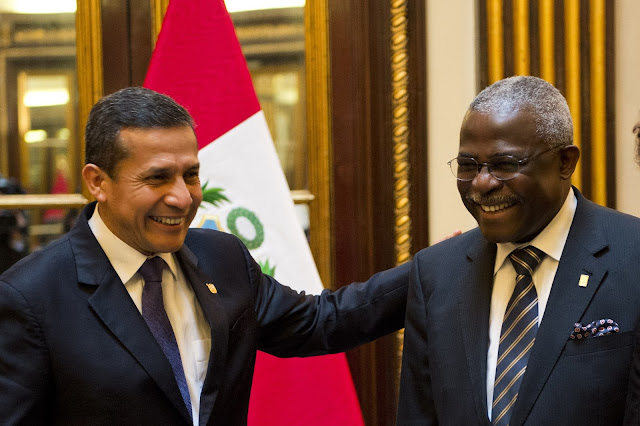President Kanayo F. Nwanze visited Peru and Colombia earlier this month. The visit was an opportunity to meet and discuss the progress and challenges of IFAD programs and projects in the two countries with beneficiaries, community leaders, regional governments, high level decision makers and the media.
 |
| Peruvian president Ollanta Humala, center left, meets with IFAD president Kanayo Nwanze at Peru's government palace in Lima, August 5, 2013. ©IFAD/ Oscar Durand |
The mission took place at a pivotal moment in both countries. Peru has taken the political decision to reduce poverty and to close the inequality gap by investing in the poor and the excluded, with resources and technical assistance. The country is also working to deepen its democracy. Communities propose what they want to do for and by themselves. At IFAD we believe that poverty reduction encompasses inclusion, transparency and community involvement and our discussions on the ground focussed largely on how IFAD can accompany the country as it seeks to achieve all of these objectives. In Colombia, as the country pivots away from years of conflict and towards the promise of sustainable peace, the launch of the “Building Rural Entrepreneurial Capacities – Trust and Opportunities Programme” (TOP) during our mission is another evidence of IFAD’s commitment to supporting the country as it seeks to write a new chapter in its history.
In addition to visiting the sites of IFAD-supported projects and bilateral discussions with top government officials, the delegation also had a chance to visit the two CGIAR centers in Peru and Colombia: CIP (International Potato Center) in Lima and to CIAT ( Centro Internacional de Agricultura y Tecnologia) in Cali. The delegation had the opportunity to tour the genebanks of potatoes (in the case of CIP) and of beans (in the case of CIAT), an amazing experience. During the visits, CIP and CIAT colleagues shared the progress made by both centres following the CGIAR reform, and we discussed possibilities for deeper collaboration between IFAD and the centres; in particular with the Latin America and Caribbean program.
Opportunities for the future
Implementing pro-poor rural development in Colombia and Peru is clearly a political and fiscal decision. Reducing inequality and opening new opportunities for the rural poor to be part of and to benefit from growth was stated by the ministers of Finance and Hacienda in both countries. And this was clearly underlined as a commitment by President Ollanta Humala of Peru and President Juan Manuel Santos of Colombia with whom the mission had the honour to meet.
Meeting IFAD-supported project teams and partners
In both Peru and Colombia, local development projects are entirely demand driven and community groups are in charge of directly managing the resources allocated to their initiatives. Building capacities, increasing participation of communities and strengthening transparency in the use of public resources are common goals in IFAD’s programs in Peru and Colombia. We witnessed with our own eyes this community involvement when we attended the Intercon event organized by the Sierra Sur Project in Peru. The Intercon is a knowledge fair and competition for new projects in the region of Arequipa where dozens of beneficiary groups presented their products. Milton Von Hesse La Serna, the Peruvian Minister of Agriculture and Irrigation accompanied the the IFAD delegation.
In Colombia, an exhibit with samples of project-related products was set up at the Cultural Center Gabriel García Márquez in Bogota as part of the launch of TOP. We had a chance to meet with representatives of several farmer associations who are successfully marketing their goods and services as entrepreneurs. Their products ranged from public private partnership initiatives between producer associations and companies such as a Frito Lay and fair trade.
The TOP focuses on helping reconstruct the socio-economic fabric and respond to the needs of those who are returning home to rural areas by creating jobs and support micro enterprises and economic initiatives.
| IFAD president Kanayo F. Nwanze visits the International Potato Center (CIP) with Director Pamela Anderson in Lima, Peru. ©IFAD/ Oscar Durand |
| Women from Sibayo, a town in Arequipa, Peru, wait for visitors at a ecomuseum, a place where visitors can learn about the alpaca craft making. ©IFAD/ Oscar Durand |
The President’s timely visit to these large Middle Income Countries was an opportunity to explore IFAD’s experience in the region and how our work in Peru and Colombia can show the way for others. In Peru after decades of innovation with pro-poor rural programs, which have been embraced and replicated by governments to become national programs and a matter of policies, new innovations are necessary. In the context of new fiscal and social developments, regional governments in Peru are seeking to engage with direct lending from IFAD.
In Colombia, where rural development and land is the cornerstone of a Peace Accord that is rapidly coming to fruition, the relevance of IFAD’s work was confirmed by the Minister of Finance, local leaders and the President of the Country.. Lending and non-lending activities, knowledge and technical assistance, and bringing IFAD’s global knowledge were areas of potential partnerships.
| IFAD president Kanayo Nwanze meets with Peru's minister of economy and finance Luis Miguel Castilla Rubio in Lima, Peru, August 5, 2013. ©IFAD/ Oscar Durand |
In conclusion of his visit President Nwanze said "we have witnessed the energy, the potential and the commitment of rural communities to offer what they have and to put it to work for the development of their territories, their cultures, their organizations, their ideas and their capacities. Like Peru, other countries in the world are still striving to build inclusive, prosperous rural areas. I thank you all for the opportunity you have given me to learn what you are doing, to see at first-hand how you are doing it, and to share your challenges and your achievements.”
| IFAD president Kanayo Nwanze attends the IV INTERCON 2013 fair in Quequeña in Arequipa, Peru August 3, 2013. ©IFAD/ Oscar Durand |